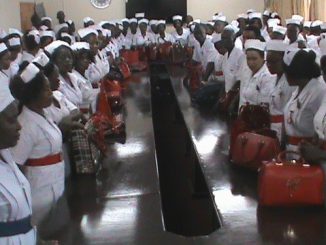
Titus Boye-Thompson, Communications Expert
The predominant discourse on agricultural paradigms in sub Saharan Africa reflect production methodologies and land management systems, the implications of which are critical in any assessment of the future of agriculture within the Sierra Leone economy.
The recent history of the country must also be of significance if there is to be a full and proper assessment of its ability to leverage interest in the agriculture sector. Invariably, systems of production and productivity have so far failed to meet the primary objective to feed the nation and to enjoin the sector in what is easily referred to as self-sufficiency. This is due in part to the prevailing paradigm characteristic of the low value attached to the market dynamics of agriculture.
In order to deliver the type of paradigm shift that will result in a complete re-focus of agriculture as a business oriented sector and a substantive contributor to GDP, considerable effort is required on several fronts such as re-education and community engagement; deploying a communications strategy to reflect a development communication bias; engaging farm communities on a cultural and traditional re-orientation; and undertaking a critical review of practices and laws that are inimical to sector liberalization, especially those that constrain expansion or integration of new entrants to the sector in the rural areas. These issues reflect the serious task of re-balancing priorities and engaging on a broad based awareness of the value of agriculture to the national economy and its implications for the prosperity of predominantly agrarian communities in the rural areas where over 65% of the population reside.
Sierra Leone has had to contend with some debilitating setbacks starting from one of the most brutal civil wars in the history of conflict in Africa. The rehabilitation of the country was hardly completed when the Ebola virus disease became a ravaging disaster that threatened the very survival of the country. The death toll, the pressures on our social and economic life together with the negative impact on inward investment combined to reduce economic growth from a vibrant double figure projection to almost zero. In the space of three years, the country had to endure rapid contraction of resources, earnings and productivity.
Notwithstanding the pressures put on social and economic interaction, Sierra Leone’s agriculture sector retained some degree of resilience. The falling commodities prices, especially for ferrous metals such as Iron Ore caused a drastic loss of revenue for Government and the eventual collapse of the mines came as a major blow to foreign exchange earnings. The resilience displayed by agriculture was demonstrated by the fact that food crops were available at such a level that the prospects for hunger and food insecurity were either stabilized or reduced during the onslaught of the EVD, as opposed to other sectors such as mining or infrastructure where a complete shutdown of operations was put into effect. The fact that most of the agricultural produce are organic and perennial was sufficient to secure availability coupled with the closing of borders meant that most food items that would have been sold off to neighbouring countries had to remain in the internal market hence helping to keep prices stable. It is therefore lamentable that the lessons of this situational analysis failed to inform agriculture planning or food security deliberations in the period after the EVD crisis was over. The appointment of a new Minister of Agriculture, Forestry and Food Security failed to make an impact as no new initiative nor paradigm shift deployed to augment the resilience of the agriculture sector post EVD. What is now evident is a slump in production and productivity and a complete neglect of agricultural research and datasets that inform productivity planning and food security discourse.
It is in this context of the local conditions faced by Sierra Leonean farmers that considerations of agricultural paradigms need to be addressed. In Sierra Lone, almost 80% of agricultural productivity comes from small holder farmers. Their production capacity is low, characteristic of farm acreages under cultivation, land availability and restrictions on securing higher acreages to put under cultivation. Productivity is also low due to techniques and the combination of inputs and fertilizers. For example, rice, the staple food in the country provides an average of less than 2 tonnes per hectare in terms of yield in the upland areas and slightly over 2.5 tonnes per hectare in the lowland swamps and boli lands. This compares less favourably to countries such as Mali where farm outputs of around 4 tonnes per hectare are delivered for the same crop, yet rice from Sierra Leone still finds its way into the Malian market. To the extent that most farmers are engaged in subsistence farming, this holds out some tractable issues for food security.
The burden that government now has to contend with is to support small holder farmers to do two things at the same time. They should increase production by increasing areas under cultivation and secondly, increase productivity by enhancing farming processes through mechanization, the adoption of crop rotation and the extension of research through improved varieties. Once this is firmly in place, then the processing of agricultural produce along the value chain from the farm gate to the dinner table would result in what could best be described as a commercialization of small holding. This area constitutes the basic failure of the Ministry of Agriculture, Forestry and Food Resources in its present configuration. The gains that were expected from small holder commercialization is slowly being eroded by procrastination and time wasting that presupposes an ignorance of the central tenets of the concept.
The Ministry has lost its clear management synthesis that allowed for Projects and the line staff in the Ministry to deliver as a team. The current management or Ministry supervision has eroded any relevance of Ministry line staff as technical support to Projects and the accountability processes have been dismantled with greater decision making and policy interventions being usurped by the Minister’s new invention, the Strategic Advisory Unit at the Ministry that sadly, has inadequate control over the technical component of Project management and delivery cycles to make a positive difference.
Alongside supporting small holder farmers to increase productivity should be the realization that larger farms mean more commercial and sustainable production. In this regard, Government the Ministry would have been better served if it had directed some of its attention to supporting or otherwise engaging large farm networks through farmers’ cooperatives and other indigenous nationals who may wish to engage in large scale farming. There is admittedly very little scope for this type of paradigm since the traditional nature of land holding is restrictive, and to the extent that the laws in rural areas restricts some citizens from even owning lands in the Provinces which are mainly where the agricultural lands are located. The issues raised here require that the Ministry leveraging flexibility in project design and delivery schedules to augment productivity and production objectives across the existing paradigms.
The above paradigms throw up challenges for Sierra Leone’s agriculture to the extent that a shift sufficient to produce change and progress is what is urgently required from the Minister of Agriculture, Forestry and Food Security, Prof. Patrick Monty Jones. His experience with farmers seem to be limited and in some ways detract from his perceived expertise as a rice researcher. To have occupied that office for over eighteen months without a single grain of rice being set aside as government stock is a national disgrace, let alone his super vising a strategic priority to integrate local rice as component of institutional feeding. In the event, it is no wonder that agriculture has thus far failed at prioritizing His Excellency the President’s initiative on Ebola recovery and has also failed to achieve the key result to create around 10,000 jobs in the sector.




